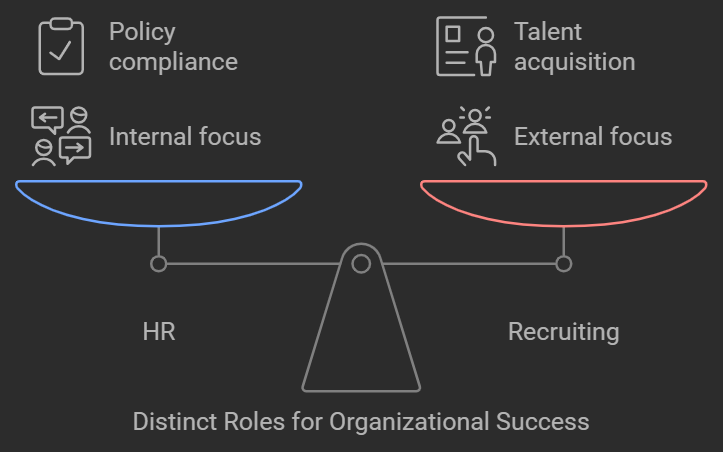





The notion that "HR and Recruiting are two peas in a pod" has been around for ages. The classic corporate motto goes something like this: "Strategic hire, engage thoughtfully, and retain intentionally." Motivating, right? Feels like a TED Talk slogan. But take a closer look, and you’ll realize it might be setting you up for failure.
Before you start throwing things at the screen, let me explain: HR and Recruiting aren't meant to work together. Yup, I said it. It’s like this: HR is the company’s lifeblood—keeping everything in check—policies, compliance, culture. Recruiting, on the other hand, is fast, sharp, and hunting for top talent. Trying to combine them is like asking a mechanic to treat your flu. Both are great at their jobs, but they don’t do the same thing. Mixing them only leads to confusion and inefficiency.

Before we dive into the nitty-gritty, let's clarify what HR and Recruiting really do. Think of them like characters in a buddy movie—except they're not the best of friends.
Right away, you can see these roles don’t mix. So why would anyone try to combine them into one team? That’s a recipe for disaster.
Picture this: you’re a candidate looking for a new job. A recruiter from your dream company reaches out. You have a great conversation. They hype up the exciting projects your potential team is working on. It’s thrilling! But then, suddenly, BAM! The recruiter switches gears and starts talking about maternity leave, health insurance, and the company’s 401(k) plan.
You’re probably thinking, “Wait, what just happened?” That’s the problem when HR and Recruiting share the same role. A recruiter’s job is to sell the company’s future to the candidate. They’re not supposed to bog you down with benefits details—that’s HR’s turf.
Why is this a problem? Let’s break it down:
So, what’s the solution? Simple: keep them separate and let each department do what they do best.
We all love the idea of a “one-stop shop.” It sounds efficient, right? But in reality, it’s an illusion. The moment you combine HR and Recruiting, you start losing the essence of both roles. Here's why:
It’s like having two drivers in the same car—one racing to the finish line, while the other’s stuck in traffic. It doesn’t make sense.
Here’s the deal: HR and Recruiting are not enemies—they’re just two very different functions. And when allowed to do their own thing, they can work together strategically to drive the company forward.
But here's the catch: splitting these two departments isn’t just about creating space for them. It’s about giving them the right tools and autonomy to thrive.
So, how do you make this split work without chaos? Enter Xyntara ATS, a recruitment tool designed to give both HR and Recruiting teams the power to thrive independently, while still staying connected.
With Xyntara ATS, you’re not just separating these roles—you’re empowering them. It creates an environment where both teams can do their jobs more effectively without stepping on each other’s toes. The result? A stronger, more efficient hiring process and a more engaged workforce.
Trying to merge HR and Recruiting into one team is like forcing a square peg into a round hole. These roles are meant to work together, but they need the freedom to focus on what they do best. And that’s where Xyntara ATS comes in. It helps both teams stay focused, empowered, and efficient. With Xyntara, HR and Recruiting can each play to their strengths, ensuring your company lands top talent and keeps employees engaged for the long term.
So, here’s the takeaway: it’s time to let HR and Recruiting go their separate ways. Give them the tools they need to succeed, and watch your company grow.